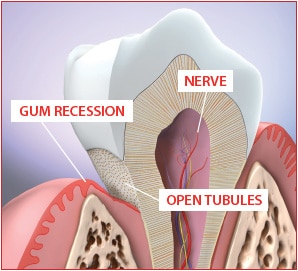WHY ARE MY TEETH SENSITIVE?
A Brief Explanation of Root Sensitivity
Have you ever had that nagging sensitivity in your teeth when you brush, drink cold liquids, eat sweets, or just breathe air into your mouth? Don’t panic, it’s probably not a cavity. Cavities are usually the assumption people make but the sensitivity is usually the result of a common condition called “root sensitivity” or synonymously, “dentin sensitivity.”
Root sensitivity is caused by the stimulation of nerve endings on the root surface, which are emanating from the mass of nerves and blood vessels inside the tooth called the “dental pulp.” The nerve endings travel from the pulp through tiny hollow tubes in the “dentin”—the layer of tooth structure usually covered by “enamel” above the gum line and “cementum” below the gum line. If the gums “recede” (move away from the enamel down onto the root surface), and the protective cementum layer erodes or is abraded off of the root surface, the ends of the tiny hollow tubes called “dentin tubules” are exposed; the sensitive nerve endings are contained within these dentin tubules. Acidic foods, abrasive dentifrices, or stiff toothbrush bristles are common reasons why the cementum is either eroded or abraded away, leaving the bare nerve endings exposed within the tubules. Liquids, mechanical stimulation from brushing, or eating can disturb the exposed nerve endings, causing the “sharp zing” or “electric” sensation patients often describe to me as “sensitivity.” What can be done about this condition?
The answer to this is lengthy and depends on several factors, including:
- How severe the gum recession is
- Whether or not decay is present in the area of recession
- Whether or not previous treatments have been successful
Stay tuned to the blog for the explanation…

